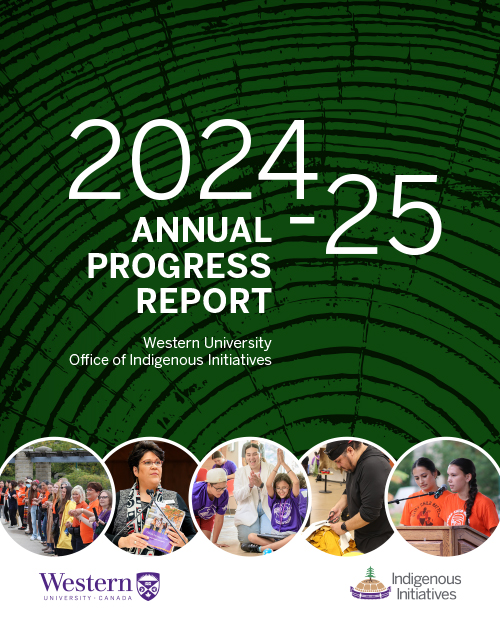Memegwaanh: Indigenous Learning Honour
“Education got us into this mess, and education will get us out of it.”
(Honourable Justice Murray Sinclair)
About the Honour
Since the release of the Truth and Reconciliation Commission’s report on Indian Residential Schools in 2015, there is increasing momentum around Indigenization and Decolonization in higher education. Increasingly, employers are seeking university graduates -both Indigenous and non-Indigenous -that have the knowledge and experience to meaningfully engage with and meet the needs of Indigenous Peoples both in Canada and globally. To do this, our students must critically engage with historical and contemporary perspectives of international and local Indigenous-settler relationships and Indigenous experiences. Western’s Indigenous Learning Honour will recognize students’ engagement in such efforts towards Truth and Reconciliation during their time at Western.
Once completed, the Honour will appear on the student’s official transcript upon graduation. The structure of this program requires students to incorporate both curricular and extracurricular activities. Students awarded this Honour will graduate with the perspectives and tools necessary in navigating and supporting Truth and Reconciliation efforts on a personal, professional, and collective level. While academic coursework will allow students to build their understanding of Indigeneity on global, national and local contexts, extracurricular activities will primarily focus on a Canadian context.
This Indigenous Learning Honour was created in response to a recommendation of Maamwi Gzikewag: Indigenous Curriculum & Learning Report and based on the initial work of a Head & Heart Fellowship project by Camille Di Iulio, both in 2021. The name and logo are both inspired by this initial work; Memegwaanh is the Anishinaabemowin word for butterfly and “represents the transformative potential that Indigenous ways of knowing offer students in terms of its deep epistemological and paradigmatic shifts” (Di Iulio, 2021). The colour of the butterfly in the logo represents the Honour’s relation to Western but includes Woodland-style florals to depict its distinctly Indigenous nature. The medicine wheel, a symbol recognized by many Indigenous peoples in so-called Canada, represents the holistic learning and healing that is possible as students complete this Honour.
Learning Outcomes
- Recognize and build respect for diverse Indigenous cultures, histories, contemporary perspectives and experiences
- Engage meaningfully in Indigenous initiatives on campus and in the community
- Develop local, place and land-based understandings of Indigenous knowledges and Truth and Reconciliation movements
Who is eligible?
Why achieve the Honour?
- Enhance your degree with recognition on your transcript for intercultural understandings and practices of communication with diverse Indigenous communities in colonial contexts.
- Develop personal, professional, and collective actions of reconciliation in alignment with the Truth and Reconciliation Commission Calls to Action, both locally and globally.
- Broaden your network with Indigenous Peoples, communities, and organizations respectfully.
- Assess how colonialism continues to affect Indigenous Peoples.
How to achieve the Honour?
Category One – Academic Coursework
A minimum of 20 points to a maximum of 50 points must be accumulated from this category.
*Please remember each course may have unique pre-requisite or anti-requisite courses
Category Two – Dual Stream Learning
Recognizing that everyone is on their own learning or reconnecting journey, there are two options for students in Memegwaanh which enable the students to choose what is best suited for their journey.
A requirement of exactly 15 points from this category.
Stream One: Open to all students enrolled in Memegwaanh
KAIROS Blanket Exercise and 4 Seasons of Reconciliation (15 points)
Stream Two: Open to Indigenous students enrolled in Memegwaanh
Attendance of Ceremonies or cultural workshops on campus (15 points)
Category Three – Learning & Unlearning Workshops
A minimum of 20 points to a maximum of 50 points must be accumulated from this category.
Category Four – Community Engaged Learning (CEL)
This category is not required while capacity of Indigenous-focused and Indigenous-led experiences are being created, but this section is highly encouraged.
Application Process
Step 1
Read all the Indigenous Learning Honour webpages on the Office of Indigenous Initiatives website
Step 2
Enroll through Western Connect
- On the left sidebar, Indigenous Learning Honour is listed under “Recognition”
- Click ‘Enroll Now’ beginning on September 30, 2022
- Complete the intake questionnaire immediately
Pathways to achieve the Honour?
Example 1 |
Example 2 |
||
Awarded Honour focusing on CEL and workshops |
Awarded Honour focusing on Coursework |
||
|
Sociology 2108F – Decolonizing Social Science |
10 points |
Health Science 1002B |
5 points |
|
Geography 2411G – Indigenous Environments |
10 points |
Health Science 3071A |
5 points |
|
Stream Two |
15 points |
Health Science 3263B |
5 points |
|
Indigenous Law workshop (OII) |
5 points |
Indigenous Studies 1020E |
20 points |
|
Volunteer twice with KBE |
10 points |
Indigenous Studies 2601E |
10 points |
|
Indigenous Impact Experience |
20 points |
Indigenous Voices (twice) |
10 points |
|
Indigenous Exchange Program |
30 points |
Stream One |
15 points |
|
|
|
Head + Heart Fellowship |
20 points |
|
|
|
More Than Words Module |
10 points |
Total |
100 points |
Total |
100 points |

